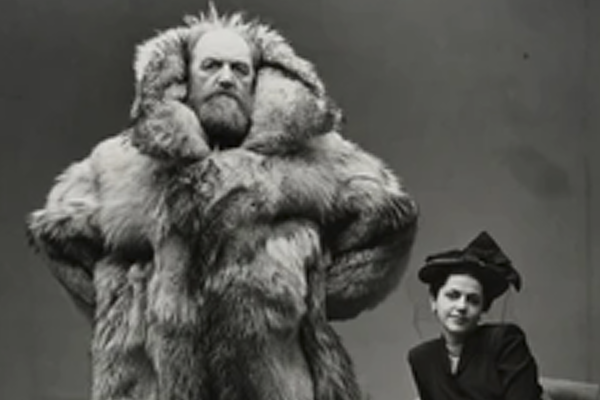Arctic Explorer, Nazi-Fighter, Iconoclast: Peter Freuchen's Case for "Most Interesting Man in the World"

Peter Freuchen and wife Dagmar, photographed by Irving Penn for The New Yorker, 1947.
When Dos Equis beer launched its “Most Interesting Man in the World” advertising campaign in the mid-aughts, actors seeking the role were asked to improvise wild tales of derring-do that somehow ended with the punchline “…and that’s how I arm wrestled Fidel Castro.” The American actor Jonathan Goldsmith was eventually cast as the debonair, gray-at-the-temples swashbuckler who, in the subsequent commercials, recounts a lifetime of other similarly larger-than-life experiences—all of them fictional. After the campaign became a knockout success, lighting up Super Bowl time slots and spawning a popular internet meme, a few hidden-away corners of the internet began debating who the “real” Most Interesting Man in the World was. With all due respect to Mr. Goldsmith, who legitimately led an intriguing life of his own, people were curious to discover actual historical figures whose lives captured the outrageous sensibility of those beer commercial fantasies—a quixotic mix of random serendipity, luck, and quirkiness.
One of the leading contenders was Peter Freuchen, the subject of my upcoming book Wanderlust: An Eccentric Explorer, an Epic Journey, a Lost Age. Freuchen was one of those old-school multi-hyphenates who was an accomplished polar explorer, writer, actor, WWII resistance fighter, civil rights advocate, and, on many occasions, prankish raconteur. His other offbeat accomplishments included marrying into a margarine empire, raising awareness about climate change before anyone was calling it that, running a boxing league, charming the FBI agents responsible for compiling a file on him, driving across the U.S. with a criminal on the run, driving across the U.S. in the other direction with a contestant for the Miss Universe pageant, and briefly becoming one of the most recognized people in the U.S. after winning the top prize on the legendary game show The $64,000 Question. Ironically, he rarely drank beer.
Freuchen’s out-of-nowhere adventures fit the general vibe of the Dos Equis commercials, but what made him truly “interesting”—and not just a passing curiosity—was his heterodox thinking. The man zigged when others zagged, creating a life for himself that defies easy summary as much as it defied convention. His politics were almost impossible to pin down, his (several) marriages were usually open, and his thoughts about religion were as complicated as religion itself. But he wasn’t just a mere contrarian; there was a coherent logic to his attitudes, inscrutable as it could sometimes be. Non-conformist but nonetheless appreciative of tradition, his approach to life guided his many adventures to their unlikely outcomes. It generally involved an avoidance of labels, a willingness to let facts lead him to carefully considered conclusions—often defying conventional wisdom—and a refrainment from organizing his beliefs along partisan lines. It’s fair to argue that this approach wasn’t always bulletproof—no truly interesting person lives a life without mistakes—but it probably helped him leave this world better than he found it.
As a result of his heterodox nature, people often didn’t know what to think of Freuchen—and certainly didn’t know how to categorize him. Burkean conservative? Marxist liberal? Both? Neither? It’s not that no labels applied to him; it’s that all labels applied to him at one point or another—he was protean, adjusting his thinking as he became wiser with experience. After WWII, when Freuchen was living in the U.S. and the FBI did a background investigation on him—he’d spent time in the Soviet Union and flirted with communism, only to become wary of it—the investigators couldn’t compile a coherent profile assigning him to any easy-to-define category. Right-leaning types thought he was a lefty, while lefty types sometimes thought the opposite.
The only thing people generally agreed upon was that Freuchen had a pretty good sense of humor—except for the people who had been targeted by it. What emerged from the investigators’ reports, and from the accounts of others who knew him, was a picture of a man who was refreshingly individual, embraced nuance, and wasn’t afraid to push back against the groupthink that frequently plagues established political parties and cultural cliques. In doing so, he often saw around corners that others couldn’t see around; for instance, warning people about climate change as early as the 1930s.
Over the course of his life, Freuchen published thousands of pages of newspaper and magazine articles, short stories, plays, memoirs, and novels—many of them touching on perennially controversial topics like colonialism, race, and sexuality. Because of his heterodox nature, his observations don’t tend to spare any particular group along the political spectrum. This means that reading his words today conjures an image of a man skating atop very thin ice, pulling off pirouettes, twizzle turns, and axel jumps that leave modern readers—especially those familiar with the nuance-intolerant culture of the social media platforms where those issues are discussed today—gasping in nervous anticipation as they wait for the ice to shatter and swallow Freuchen whole.
Not all his moves land with perfect grace, but, when shaky, and after a little more context is provided, he usually regains his balance. He achieved this by being consistently thoughtful and generally refraining from judging others, as he probably preferred to be judged himself. He was a true individual, immune to easy categorization, and treated others as such, ignoring those shorthand assumptions that humans so frequently use to divide rather than unite. Because he couldn’t be placed in a box, he recognized that other people shouldn’t be either. This opened doors for him that otherwise wouldn’t have been opened: to relationships, opportunities, and the wide assortment of adventures that ultimately enabled him to become the “real” Most Interesting Man in the World.